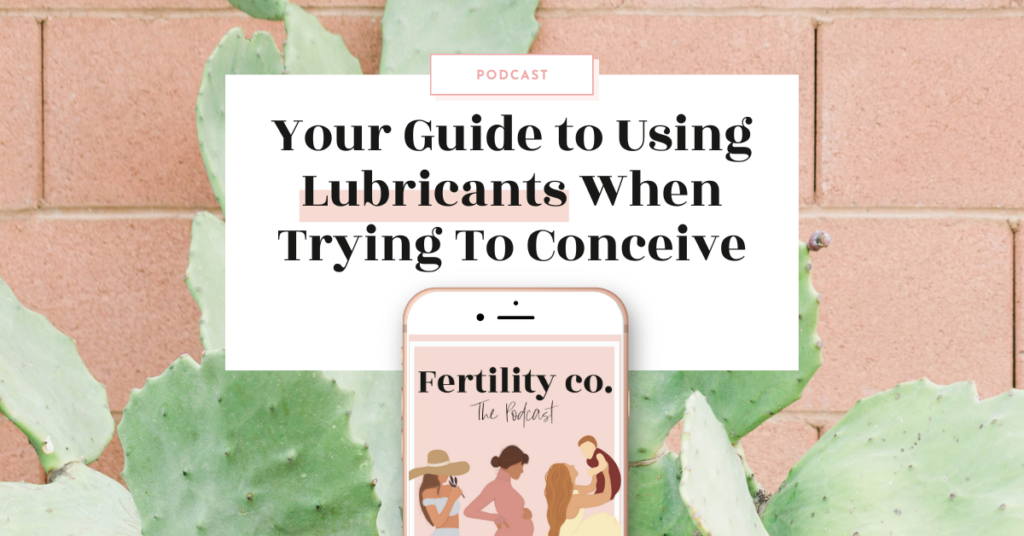
LISTEN ON: APPLE PODCASTS | SPOTIFY
To lube, or not to lube? That is the question.
And if it’s one you’ve been asking yourself too, then I have the answers for you.
There’s a question that has suddenly started to pop up in my DMs and inbox. A lot of you are asking about how to safely use lubricants when trying to conceive, so I thought it was time to answer your questions. If you’re trying to conceive, you want to make sure you’re doing everything possible to maximise your chances. Something that a lot of you are certainly starting to consider is the effect that your standard supermarket lubricant could have both on your fertile cervical mucus as well as his sperm.
HERE’S WHAT WE COVER
- Do you need to use lubricant?
- Are lubricants safe when trying to conceive?
- Which lubricants are best when trying to conceive?
EPISODE NOTES
Do you need to use lubricant?
The first thing we really need to consider is whether a lubricant is necessary. Ultimately lubricants are used to enhance sexual pleasure and reduce discomfort during intercourse.Some couples don’t need to routinely use a lubricant during sex and that’s totally fine, it’s not something you need to introduce when trying to conceive. I’m more talking to those couples who do use lubricants regularly and are wondering if this could impact their chances of pregnancy.
There does seem to be some confusion about vaginal dryness during the fertile window. So I want to make it clear that the arousal fluid that our vagina produces when we are aroused or having sex is a protective mechanism for the delicate tissues in and around our vagina. This is not an area where we want friction, so our body naturally produces lubricative fluid to protect our tissues. This is very different to the lubricative or slippery sensation we may feel during our fertile window as a result of the presence of fertile quality cervical mucus. The presence of this fertile mucus is not the same thing and this isn’t necessarily enough to lubricate our tissues. So, just because you’re feeling dry in the lead up to or during sex doesn’t mean you don’t have fertile mucus present. I don’t want to draw too much attention to this because I don’t want you to start overthinking it – let’s just say that when you’re aroused isn’t the ideal time to be deciding whether or not you are fertile, or wet or dry today. You need to make that observation at another time or you will get confused.
Vaginal dryness can be linked to low oestrogen levels, for example post-partum and when breastfeeding as well as approaching menopause. Needing a lubricant doesn’t mean you have low oestrogen levels, but these are times when a lubricant may make things more comfortable.
Are lubricants safe when trying to conceive?
If you need to use a lubricant, then you need to keep using a lubricant when trying to conceive or you will be uncomfortable and you’ll likely not enjoy the baby making process. Using a lubricant does not enhance your chances of conceiving, so you don’t need to start using it if you don’t need to, but it is best to switch to a sperm and conception friendly lubricant during this time. I’ll share some specifics later, but first let’s talk about the potential effects of a standard lubricant on conception.
The vagina is obviously a very delicate environment and we know that at different times in our menstrual cycle, pH levels, different types of mucus all contribute to sperm’s survival. In our non fertile windows sperm dies in a matter of hours in the inhospitable vaginal environment, whereas during our fertile window pH levels are optimal for sperm’s survival and we know that the presence of fertile mucus nourishes sperm, keeps sperm alive and guides cells towards the cervix and the egg waiting to be fertilised. We ultimately don’t want a lubricant to disrupt this environment when trying to conceive. And that is the potential issue.
Apply the lubricant just before intercourse and only use a modest amount. A little goes a long way and the goal is to reduce friction. You don’t need to use copious amounts as we don’t want to dilute sperm concentration. The key reason why you want to use a conception specific lubricant is because many lubricants have spermicidal properties. Even if you’re not specifically using a lubricant that acts as a spermicide, many will contain substances that are detrimental to sperm health. Another bonus of conception friendly lubricants is that they are though to mimic the consistency of our fertile mucus, so they’re not interfering with sperm’s motility and access to the cervix.
Which lubricants are best when trying to conceive?
1. Pre-Seed: This lubricant is specifically designed for couples trying to conceive. Pre-Seed mimics the body’s natural cervical mucus and provides a sperm-friendly environment to maximise your chances of successful fertilisation.
2. Conceive Plus: A fertility-friendly lubricant that supports the vaginal environment by maintaining optimal pH levels. It also contains calcium and magnesium ions, which are considered essential for sperm health.
3. Baby Dance: A sperm-friendly lubricant that closely resembles the body’s natural fluids. It helps to nourish and protect sperm to maximise the chances of successful conception.
I hope you found this helpful. This is a question that has suddenly started to pop up over and over and it is really important to think about incorporating sperm-friendly lubricants to improve your chances of pregnancy success. By using a fertility-friendly lubricant and remembering to use it sparingly – just for reducing friction – you’ll create an environment that promotes sperm motility and viability, and increase the likelihood of conception.
Once again, you don’t need to start using a lubricant if you don’t typically need it, it’s not going to increase your chances of pregnancy; but it is important to consider the right one to avoid reducing your chances.
I’d love to hear from you – what conflicting information and advice have you heard about using lubricants when TTC?

+ show Comments
- Hide Comments
add a comment